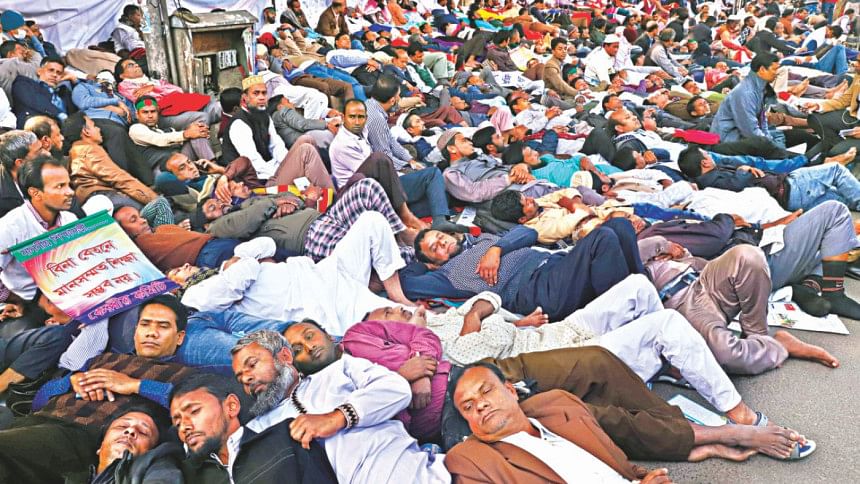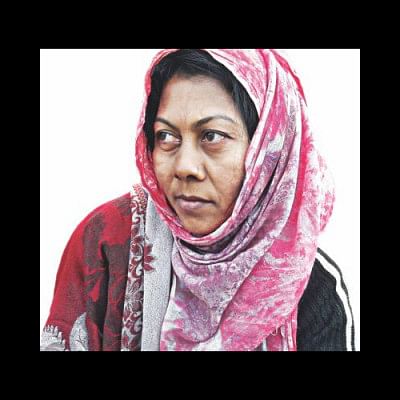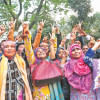Fourth Day of Demo for MPO Facilities: Hunger strikers stay resolute

Rabeya Bosri stopped looking for other jobs when she got an opportunity to teach at a new high school in her village in 2002.
It was an unpaid job but Rabeya was particularly excited about it as she was still an honours student at Satkhira Government College. She was assured that she would be appointed as an assistant teacher and receive salaries as soon as she passed her final exam.
Rabeya got the appointment accordingly, but the remunerations are still pending.
And now, the 35-year-old keeps thinking whether she made the right decision by choosing teaching as her career. Where she is teaching, Tetulia High School in Tala Upazila, is yet to be brought under the government's Monthly Pay Order (MPO) facilities.

Rabeya, mother of a child, earns her living by giving tuitions to students in the evening. Her three-member family depends on that meagre income as her husband is too sick to work.
“I have become completely hapless. There can be no pain greater than this," she says, adding that she sees the ongoing teachers' hunger strike in the capital as a last resort.
She has joined more than 1,000 other teachers and employees of non-MPO education institutions in the fast unto death in front of the Jatiya Press Club, demanding inclusion of around 80,000 teachers and employees of 5,242 government-recognised educational institutions in the MPO.
The strike, which rolled into its fourth day yesterday, saw a huge number of participants, who vowed to continue the demonstration until the government gives a specific timeframe for meeting their demand.
On Tuesday, the agitating teachers rejected the education minister's call to end the programme and announced to continue it until death.
“After the education minister, none from the government has talked to us. So, we will continue our agitation,” Golam Mahmudunnabi, president of Non-MPO Shikhya Pratishthan Shikhyak Karmachari Federation, told this correspondent around 8:00pm yesterday.
The strike, however, is taking a toll on the participants, since they have to spend the winter nights out in the open.
Until yesterday, 75 more teachers, including Golam and the federation's General Secretary Binoy Bhushan Roy, fell ill. Binoy was even hospitalised, said platform leaders.
MPO is the government's share in the payroll of non-government educational institutions. Under the scheme, the government gives 100 percent basic salaries to the teachers of non-government schools. The teachers also get a lump sum amount as other allowances through the MPO.
As per the rules, the educational institutions first come under MPO facilities and then the government includes the teachers in the payroll.
Currently, more than four lakh teachers and employees of more than 26,340 secondary schools, colleges, madrasas and technical institutes are receiving MPO facilities.
After a suspension of six years by the then BNP-led alliance government, the Awami League-led government revived the MPO facility in 2010 as per its electoral pledge and included 1,624 private secondary and higher secondary schools and colleges in the MPO scheme.
The rest of the non-MPO teachers have been staging various demonstrations for MPO facilities since then.
After staging a sit-in for five consecutive days at the Jatiya Press Club, the agitating teachers started the hunger strike on December 31.
Yesterday, some of the teachers were seen giving speeches at the protest venue, pleading with the government to meet their demand.
A number of political and teachers' platforms expressed solidarity with the movement.
A COMMON STORY
Like other protesters, Rabeya is very adamant about not going back home. She turned down requests from her relatives and former students to go to their homes and take rest.
Sitting on the road, she wrote a number of lyrics, expressing the demand, and composed them instantly. She sang the songs on loudspeakers.
“Dayal Bondhu Re, Nisthur Ei Samajer Majhe, Lanchito r Banchito Shikhkhakder Kotaho Nei Thai [....in this cruel society, the deprived teachers have nowhere to go],” she sang.
Referring to Nahid's Tuesday's assurance that they would look into the matter, Rabeya later said, “We don't want any more assurances. We want that the prime minister announces a timeframe for our inclusion in the MPO."
Rabeya's tale is not uncommon as many of the other agitating teachers have been going through the same. All of them had the same grievance -- they were being deprived of their rightful salaries.
Aminul Haque, headmaster of Chararial Khan Junior High School in Faridpur's Sadarpur, said he did not get any pay for the last 22 years. He even had to sell his land to run his family.
He said seven other teachers and staffers of the school, established in 1995, were going through similar hardship. The number of students there is 175.
Asked why he was still doing the job without pay, he said, "I do that because it gives me pleasure and honour at the same time. The hope of coming under the MPO is also my driving force."
EDUCATION MINISTRY'S MOVE
The education ministry has already started the groundwork for forming a committee, which will come up with a new policy on MPO after bringing some amendments to the existing policy, said an official.
The official said the committee would comprise officials from the education, finance and public administration ministries.
All the 5,242 educational institutions will not be included in the MPO scheme. Before the inclusion, the committee will examine the eligibility of the institutions to get the benefits.
It will take into account the number of students, their pass rate, and whether the institution is at all needed in that particular area, said the official.
“The committee will recommend that the MPO is given on a priority basis," he added.

 For all latest news, follow The Daily Star's Google News channel.
For all latest news, follow The Daily Star's Google News channel. 





Comments